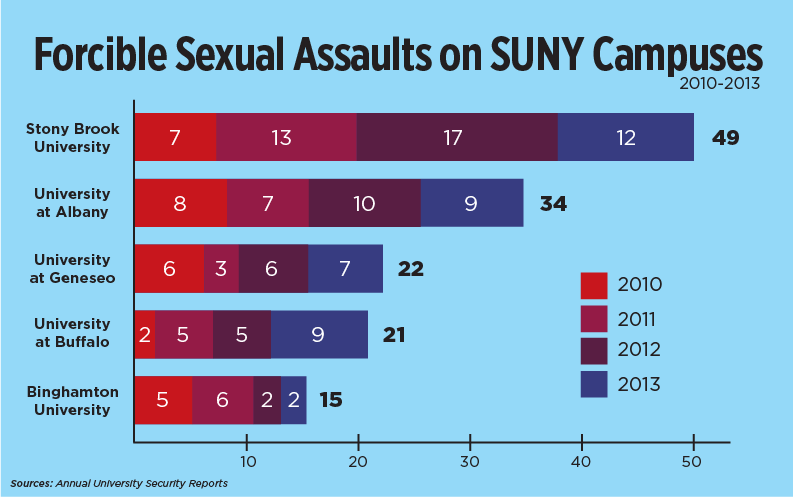
The State University of New York will soon have uniform protocol to combat sexual assaults on all 64 campuses.
The changes, which were announced by Gov. Andrew Cuomo at a press conference in Manhattan on Oct. 2, will include a system-wide definition of consent as well as a Sexual Assault Victims’ Bill of Rights that will be provided to students in the event of an attack and will inform them of their rights.
The governor said that his decree was sparked by a spike in sexual assaults on college campuses in the past few years.
“It is past the point where we are talking about one or two incidents, an anecdotal reaction,” Cuomo said. “It is an epidemic. And it is spreading.”
Cuomo explained that it is time for sexual assaults to cease being treated as internal matters at universities. He said that schools are incentivized to keep reports of sexual assaults quiet because they can bring bad publicity.
“I understand the tendency and I understand the motivation to handle it as an internal matter,” Cuomo said. “But rape is a crime. And a campus cannot define what is a crime as something less than a crime, and can’t be imposing and adjudicating what should be adjudicated as a crime.”
He also stressed the importance of having a uniform definition of consent.
“I understand the individuality of the 64 institutions in SUNY, but some things should be uniform,” Cuomo said. “A woman’s consent in Oswego should be a woman’s consent in Buffalo.”
From 2010 to 2013, Binghamton University saw 15 forcible sexual assaults on its campus, with a high of six occurring in 2011 and two occurring last year. However, Dean of Students April Thompson said that the University has been taking measures to improve safety.
“Last year, when the Violence Against Women act was updated, there were major changes that impacted college and university campuses around title IX,” Thompson said. “We took a very close look at our policies and the new acts and new language, as well as some recent decisions out of the University of Montana where they had been investigated by the office of civil rights.”
According to Thompson, the University put together a small committee in the fall of 2013 to see how it needed to change its responses to sexual assault accusations. As a result, Thompson says there is now more transparency.
“Whether you’re the student who brought us the report or the student who was accused of something, everyone has a right to know what the process will be,” Thompson said.
Thompson said that, just this month, 400 members of BU’s staff were trained on responding to reports of sexual assault.
BU President Harvey Stenger added that the University has been focused on fighting sexual assault for some time now.
“What we’ve been working on the last three years already exceeds [Gov. Cuomo’s] expectations,” he said.
Stenger added that finding a solution to this problem must be a top priority.
“We’ve got to act very swiftly and make sure that we are as proactive as possible to make sure that we stop something that is as serious as [sexual assault],” Stenger said.
However, he emphasized that the responsibility does not fall solely on the shoulders of the University, and that the governor’s announcement helped raise awareness of sexual assault.
“I’m hoping we can use this as an opportunity to make sure everyone is aware of it,” Stenger said. “I want everybody to say that this is not going to happen at Binghamton University. We’re not going to stand by idly. If we see somebody in trouble or someone who is going to become a victim of [sexual assault] we do everything that we can to help that person avoid that situation.”
Thompson shared the president’s sentiment.
“I think that any time our senior leaders are talking about the problem and making it public and making people aware of the problem, it benefits our communities,” she said. “Because we can’t resolve these problems and we can’t really make changes to our campuses unless we’re talking about it.”


